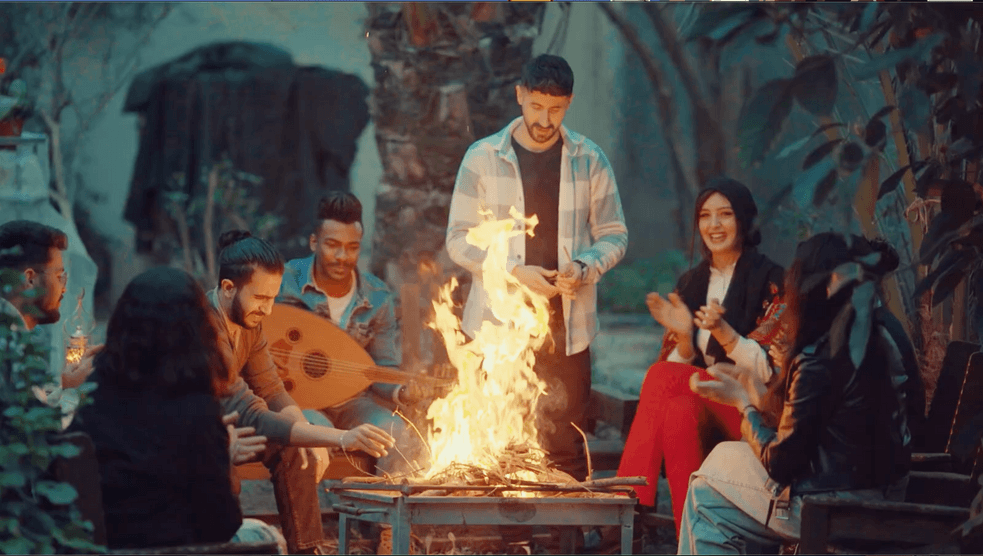Rahaf reuintes with Sol bandmates after 46 days of war.

October was set to be an exciting month for singer Rahaf Shamaly, 20, and her band, Sol, a music group from Gaza that offers a twist on Palestinian folklore songs. The band, a group of friends gathered by a love for music and whose motto is “Gaza loves life,” had plans to record an album and launch a tour. They had a busy few weeks ahead.
But on October 7th, everything changed.
“In one morning, everything was gone, everything was ruined,” said Rahaf.
That was the day Israel launched a retaliatory offensive against Hamas in response to a Hamas attack where 1,200 people in Israel were killed and hundreds were kidnapped and taken into Gaza. Since then,15,899 people in Gaza have been killed, according to the Gaza Health Ministry, and hundreds of thousands more continue to be displaced.
In the first few days of war, Rahaf, who lived in Northern Gaza with her family, held out hope. Like most young adults in Gaza, she’s lived through five wars. She thought the airstrikes would last a few days and be over.
By day three, she realised she was horribly wrong.
“Before there was an announcement that everyone in the north should go to the south, I was one of the people who stayed in my home in the north. But those two nights were among the hardest nights of my life. The strikes did not stop, it was four straight minutes of strikes, and a minute of a break, six minutes of strikes, and one minute break. We were shocked that we even survived it,” she said.
Rahaf records airstrikes on her home in northern Gaza. Video provided by Rahaf Shamaly.
Rahaf and her family were faced with a choice, stay home and possibly die in airstrikes, or leave and possibly survive. When they did decide to leave, they had nothing but the clothes on their backs.
They walked towards the south without a destination in mind. There was destruction everywhere they went.
“What is this? This is not normal, this is not normal,” she said in a video she recorded as she and her family left on foot. When the camera panned to her face, she looked around in shock.
Entire sections of multi-story buildings were destroyed. Storefronts were blocked by mountains of rubble and electrical wires dangled and touched the ground.
“I see videos and pictures of the street of my home and I can’t recognize it. I see streets I walked on, and sung on, and I don’t recognize them.”
Rahaf records her neighborhood as she leaves her home. Video provided by Rahaf Shamaly.
After three hours of walking, they arrived at Al Quds Hospital, where they sought shelter with what Rahaf estimated as nearly 20,000 other people. But their visit was short lived.
“An hour after we arrived, we were told we needed to all leave as soon as possible because the area was going to be targeted by airstrikes,” said Rahaf. “I felt like I was dreaming and was waiting for someone to wake me.”
Since childhood, music played an essential part in her life. But as the war raged on, and the situation got more dire, she couldn’t bring herself to sing.
Although Gaza has been under a blockade for 16 years, limiting imports on food and other essential goods, since Oct. 7th, Israel launched a “complete siege” and authorities said they would cut electricity and block the entry of food and fuel into the strip.
By November 16, the United Nations World Food Program announced that Gaza’s civilians faced the “immediate possibility” of starvation, as little fuel or aid was able to reach the area. On Nov. 24, a six day truce between Israel and Hamas began, and around 105 hostages taken from Israel were released in exchange for 240 Palestinian prisoners, and more aid was allowed into Gaza.
Around 200 aid trucks a day entered Gaza during the truce, but since then, that number has been reduced to around 50. Before the start of the war, Gaza received nearly 500 trucks of aid daily, and the UN has said the current amount of aid entering Gaza is not enough to sustain the population.
As the conditions continued to worsen, Rahaf said she and her family felt their spirits get lower and lower. But as an eldest daughter with multiple younger sisters, she felt a sense of responsibility.
“I needed to be their source of strength, so I started [to sing] with them,” said Rahaf. “It is something small but just so we can take a breath in these days where so much is uncertain and we don’t know when it will end.”
Rahaf reuintes with Sol bandmates after 46 days of war.
On day 46 of the war, Rahaf was finally able to reunite with her bandmates.
She said she was so grateful to have seen them, because these days, a reunion between friends is rare. Even rarer was the fact that they were all alive.
“It was a short meeting, just five minutes, ‘How are you guys? I'm glad you're safe. Take care of yourselves.’”
As of now, Rahaf said the future feels uncertain. She doesn’t know when or if her life will ever go back to normal. She doesn’t know if she’ll survive the war.
But her dreams and ambitions still remain.
“I hope to one day perform on the largest stage in the world, me and my band, carrying the Palestinian flag.”